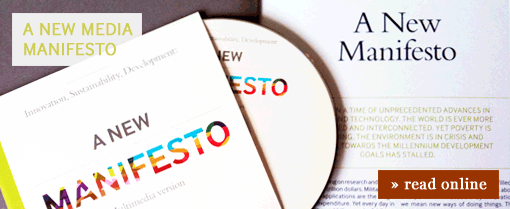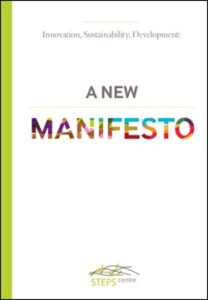In 1970 a radical document called The Sussex Manifesto helped shape modern thinking on science and technology for development. Forty years on, what kind of science and technology for development Manifesto is needed for today’s world?
In 2010 the STEPS Centre launched Innovation, Sustainability, Development: A New Manifesto with one of the authors of the original, Professor Geoff Oldham. With cutting-edge ideas from a series of Working Papers and some Southern perspectives drawn from over 20 global roundtable events, the New Manifesto recommends new ways of linking science and innovation to development for a more sustainable, equitable and resilient future.
The Manifesto is available in various formats.
Browse the Multimedia Manifesto for the full text, augmented with notes, links to media, and other resources.
Manifesto: print versions
Translations
- Manifesto – Arabic (PDF)
- Manifesto – Chinese (Mandarin) (PDF)
- Manifesto – Brazilian Portuguese (PDF)
- Manifesto – French (PDF)
- Manifesto – Spanish (Latin America) (PDF)
About the Manifesto project
Browse other pages to find out more about the project and its background.
Browse the timeline
Explore a crowd-sourced ‘timeline’ of key events in the history of innovation, sustainability and development, with contributions by students and visitors to the manifesto website.
Publications
Background papers
‘Redistribution’ Ely, A. and Scoones, I. (2009) The Global Redistribution of Innovation: Lessons from China and India, STEPS Working Paper 22, Brighton: STEPS Centre
‘Capacity’ Leach, M. and Waldman, L. (2009) Centres of Excellence? Questions of Capacity for Innovation, Sustainability, Development, STEPS Working Paper 23, Brighton: STEPS Centre
‘Philanthropy’ Brooks, S., Leach, M., Lucas, H. and Millstone, E. (2009) Silver Bullets, Grand Challenges and the New Philanthropy, STEPS Working Paper 24, Brighton: STEPS Centre
‘UN Debates’ Shah, E. (2009) Manifesting Utopia: History and Philosophy of UN Debates on Science and Technology for Sustainable Development, STEPS Working Paper 25, Brighton: STEPS Centre
‘Agriculture’ Millstone, E., Thompson, J. and Brooks, S. (2009) Reforming the Global Food and Agriculture System: Towards a Questioning Agenda for the New Manifesto, STEPS Working Paper 26, Brighton: STEPS Centre
‘Retrospective’ Ely, A. and Bell, M. (2009) The Original ‘Sussex Manifesto’: Its Past and Future Relevance, STEPS Working Paper 27, Brighton: STEPS Centre
‘Health’ Bloom, G. (2009) Science and Technology for Health: Towards Universal Access in a Changing World, STEPS Working Paper 28, Brighton: STEPS Centre
‘Water’ Movik, S. and Mehta, L. (2009) Going with the Flow? Directions of Innovation in the Water and Sanitation Domain, STEPS Working Paper 29, Brighton: STEPS Centre
‘Foresight’ Van Zwanenberg, P., Ely, A. and Stirling, A. (2009) Emerging Technologies and Opportunities for International Science and Technology Foresight, STEPS Working Paper 30, Brighton: STEPS Centre
‘Energy’ Ockwell, D., Ely, A., Mallett, A., Johnson, O. and Watson J. (2009) Low Carbon Development: The Role of Local Innovative Capabilities, STEPS Working Paper 31, Brighton: STEPS Centre
‘3Ds’ Stirling, A. (2009) Direction, Distribution and Diversity! Pluralising Progress in Innovation, Sustainability and Development, STEPS Working Paper 32, Brighton: STEPS Centre
‘Capabilities’ Bell, M. (2009) Innovation Capabilities and Directions of Development, STEPS Working Paper 33, Brighton: STEPS Centre
‘R&D Data’ Arond, E. and Bell, M. (2010) Trends in the Global Distribution of R&D Since the 1970s: Data, their Interpretation and Limitations, STEPS Working Paper 39, Brighton: STEPS Centre
Reports
Innovación, Sustentabilidad, Desarrollo e Inclusión Social: Lecciones desde América Latina (pdf, 1,460kb)
Innovation, Sustainability, Development and Social Inclusion: Lessons from Latin America (pdf, 1MB)
>> Report: New Models of Technology Assessment for Development (pdf 1.24mb)
>> Briefing: New Models of Technology Assessment for Development (pdf 236kb)
Recognition
In October 2012 the New Manifesto project won the prestigous European Association for the Study of Science and Technology (EASST) Ziman award for “the most innovative cooperation in a venture to promote the public understanding of the social dimensions of science”. Find out more about the award.

 Manifesto – English version (PDF)
Manifesto – English version (PDF)